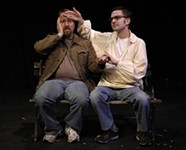Knot a Secret
After 17 years, playwright Hank Schwemmer is finally getting seen
By Robert Faires, Fri., Feb. 24, 2012
Considering how many original plays are produced in Austin every year and have been produced here every year for the past 30 years – I believe they must be outnumbering cedar trees now – you'd think the production of several short dramas by a local writer wouldn't occasion much in the way of excitement. But Woodwork: A Hank Schwemmer Collection, which the company Paper Chairs has put together and is currently running at Delta Millworks, is exceptional, however you define that word, as are the plays in it and the writer behind them.
Have you ever had a musician you loved, whose songs just knocked you for the proverbial loop, I mean, scrambling your brains with their intelligence and craft and wit, and you knew they were as smart, as complex, as daring, and as personal as any being created in your neck of the woods – that they could stand with the most lauded material out there, only nobody else knew about this guy because you could only hear his stuff during the one live appearance he made each year at this little uptown club that didn't even seat a hundred people?
That's Hank Schwemmer – to a small band of local theatre junkies, anyway. Here's a playwright who, for 17 years, has been consistently generating some of the most ingenious, inspired work seen on this city's stages, but the only time it could be seen was during Schwemmer's annual emergence during the FronteraFest Short Fringe. See, since he obtained his master's in playwriting from the University of Texas Department of Theatre & Dance in 1995, Schwemmer hasn't been affiliated with any theatre company (unless you count Texas Performing Arts, where he's long been employed building sets for plays and operas at UT) and has had no ready-made outlet for staging what he wrote. So he simply (or, more often, not so simply) started writing plays that fit the Short Fringe limit of 25 minutes and produced them himself. He crafted a new work each year, and with each, added to his circle of admirers.
Some were captivated by the one in which a game of improvisational storytelling shifts eerily from innocent wordplay to sinister groupthink. (It hooked Chronicle Arts Listings Editor Wayne Alan Brenner, who placed "The Oracle Game" at the top of his list of Top 10 Most Memorable Bits of Theatre in 2000; see "Real Estate and Perfect Mates," Jan. 5, 2001.) Some were snagged by the smart, witty riff on the blues in which Schwemmer incorporated all the basses and guitars that he's owned, explaining their names (all feminine) and their, ahem, attributes. (The Austin Critics Table was impressed, nominating "Alternate Routes to the Crossroads" for its David Mark Cohen New Play Award in 2006.) For some, it was the deconstruction of stand-up in which Schwemmer is heckled by his own recorded voice ("Almost Entirely Unlike Comedy," 2009), and for others, the chance construction of a play out of miscellaneous Schwemmer writings (monologues, songs, personal letters, dream journal entries, office memos, etc.) based on the random choices of an audience member on the night of performance ("Begging Your Indulgence: A Tarot of Sorts," 2004). For some, it was when he handed out cookies ("Why Do You Ask," 1997). Every year, Schwemmer has found ways to draw people in, and usually they don't see it coming.
"One of the catchphrases we have for FronteraFest is 'expect the unexpected,' and I think you can say the same thing about Hank," says fest producer and ScriptWorks Executive Director Christina J. Moore. "Just when you think you've got him pegged, he'll totally surprise you. He's like an artist who works in a several different media, using haiku, the tarot, scientific theory, Zen Buddhism, Laurie Anderson, etc., as jumping-off points for these little jewels."
Actor, playwright, and Paper Chairs company member Elizabeth Doss, who was 17 when she performed in "The Oracle Game," has discovered that, too: "Over many years seeing and performing Hank's work, I've learned that he never repeats himself; each play he creates is wholly unique in form, function, and content. He writes like a scientist experiments, and the outcome is usually unexpected. Sometimes he tests the bounds of reliable conventions, like slapstick comedy in 'The Situation as It Stands.' Other times, he explores text like a jazz riff, as he does in 'An Ownership Society.'"
Over time, that restless exploration, the questing intelligence forever testing theatrical limits, seeing what other catalysts can spark new kinds of stage experiences, becomes the thing that pulls his fans back: "What the hell is Schwemmer going to try this time?" And those fans have become virtually a secret society, scanning the FronteraFest schedule for Schwemmer's name, marking his performance on their calendars, and faithfully trooping down to Hyde Park Theatre that evening. Since most Short Fringe works are presented just once – a Best of the Week or Best of the Fest selection is never guaranteed – missing that one scheduled performance could mean missing the only performance of that work ever, as well as having to wait a full year for another fix of Schwemmer. As a longtime member of the Unincorporated Order of Hankophiles, I've experienced such disappointment and can testify to a distinctive shade of blue I feel upon hearing glowing accounts of a Schwemmer opus I missed and figured I would never get to see.
Of course, that wouldn't be such an issue if only someone would revive Schwemmer's plays for full runs. That might give me another shot to see a play that I missed, but more importantly, it might give theatre lovers who have never been exposed to Schwemmer's plays a chance to experience them. Every Schwemmer devotee I know has hoped for such a production. But after a certain number of years went by without anyone stepping up to revive Schwemmer's work, the odds that his plays would find a champion seemed to diminish with each FronteraFest. Schwemmer seemed fated to carry on as he had, continuing his string of one-offs in the Short Fringe, earning the odd ScriptWorks commission or Critics Table nomination, with his small band of dedicated followers cheering him on – the best playwright in town that nobody knew.
Well, that scenario wasn't good enough for the Hank freaks in Paper Chairs. "It seemed a criminal oversight that Austin had this gem of a playwright who had never had a whole night of theatre dedicated to his unique and nuanced work," says scenic designer Lisa Laratta. She had worked with Schwemmer – in the UT scene shop when she was in grad school and assisting with his 2007 Short Fringe piece, "Spooky Actions at a Distance" – as had other Paper Chairs members, and they were, as Doss says, "hankering to see Hank produced outside of a festival. Each of his plays is so carefully crafted that I wanted to see them done by a company equally committed to details. His approach to making theatre aligned nicely with Paper Chairs."
Laratta concurs: "Hank's plays feature everything that Paper Chairs gravitates toward: difficult and sad material, music, strange humor, honesty, and a tendency to let theatrics be themselves. Smoke is always just smoke and mirrors are always just mirrors. There are no tricks. Also, we just wanted to see these pieces again!"
For Schwemmer, the affection was mutual. After he saw Paper Chairs' production of Black Snow, he says, "I wanted to party with these guys." Indeed, he told Laratta that if any company was going to produce a program of his plays, he'd want it to be Paper Chairs. He began volunteering on its shows as a carpenter and a dramaturge, which just fed the notion of Paper Chairs mounting an evening of Schwemmer's plays. But the idea was pushed over the top last spring one night when several company members went to ScriptWorks' Out of Ink Festival, which included Schwemmer's 10-minute piece "Joyce, or the Unknowing." Doss was sitting next to Paper Chairs Artistic Director Dustin Wills and recalls, "During Hank's play, Dustin kept grabbing my hand and whispering, 'This is so good.' That night, we told Hank we wanted to produce 'Schwemmer Fest.'"
The project almost ended before it began, however, when Wills left town last fall to study directing at Yale. His directorial work had been a huge draw for Schwemmer working with the group, and without him, the playwright had "serious reservations." But the company was committed. "When we met to discuss our next production, we knew our first show without Dustin needed to be very special," says actor Kelli Bland, "and we unanimously decided we wanted to produce this." Schwemmer recalls showing up at the first project meeting and being met by "a dozen beaming faces all saying, 'Come on, come on, we really want to do this!' Every playwright should have a moment like that."
The company members looked at about a dozen of Schwemmer's plays, reading them aloud with different actors in different locations to explore what material people connected to personally, which plays fit together, and what gave the company what Laratta calls "choices in the rhythm of the night itself in terms of tone, weight, humor." They settled on six they felt represented what Doss calls "the breadth of Hank's mind," and after dividing the pieces among directors Bland, Doss, Laratta, and Keri Boyd, the collaboration began.
As you might imagine for a guy who's spent his career as a solo act, suddenly having a band to work with was an adjustment. "It's exhilarating to have such resources of energy and intelligence at the service of my plays," Schwemmer says. "These people have skills and insights I don't have, and that very factor makes conflict of perception and opinion nearly inevitable. I'm smart enough to realize that my preferences are not automatically more sound or important than a colleague's – refer to Roland Barthes' essay 'The Death of the Author' – but dammit, I've got an MFA, I must know something! And so we negotiate. Or have a walk-off. Is David Bowie nearby?"
"We all have been navigating our way through attachment to our own ideas about interpretation and design of each piece," says Bland. "I think Hank's work lends itself to a specific difficulty in that his plays are processed so personally. We all, including Hank, seemed to have differing ideas about what the plays mean, how they should look and sound in such a strange setting as Delta Millworks. What is good about working this way, at least our hope, is that this production will be the best of all our ideas."
Flash back to 1996 and Schwemmer's first FronteraFest effort: "Danny and Livvy," which he had enlisted Shannon Mayers, a graduate from the UT directing program, to direct. She had cast actors Anne Hulsman and Adam Wilhite in it. The piece was, in the author's estimation, "a hair too long and prop-heavy in practical terms," but "it was an absolute gas to realize that directors and actors – good ones – wanted to work with me. Even now, this only barely sinks in."
That tells you something about Hank Schwemmer and his exceptional career. It may be part of what Bland is picking up on when she describes his plays as "strange, heady, funny, self-loathing, and intensely introspective. It's all the facts, thoughts, and feelings that run over and over in your head, processed through synthesizers. An unfinished heart that forever continues to be sanded and polished."
Woodwork: A Hank Schwemmer Collection runs through March 4, Thursday-Sunday, 8pm, at Delta Millworks, 4701 E. Fifth. For more information, visit www.paperchairs.com.












